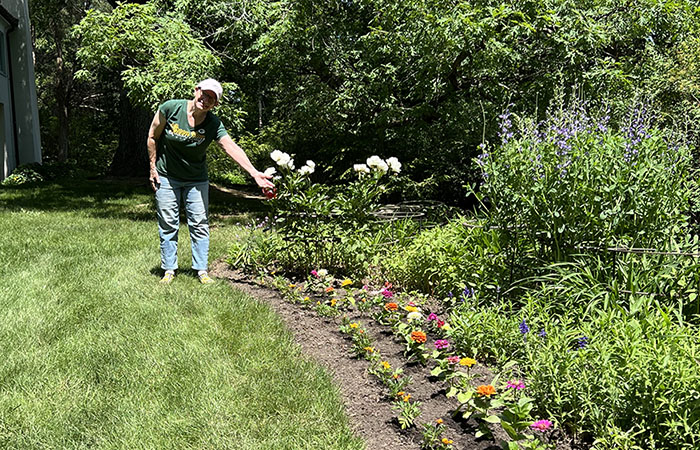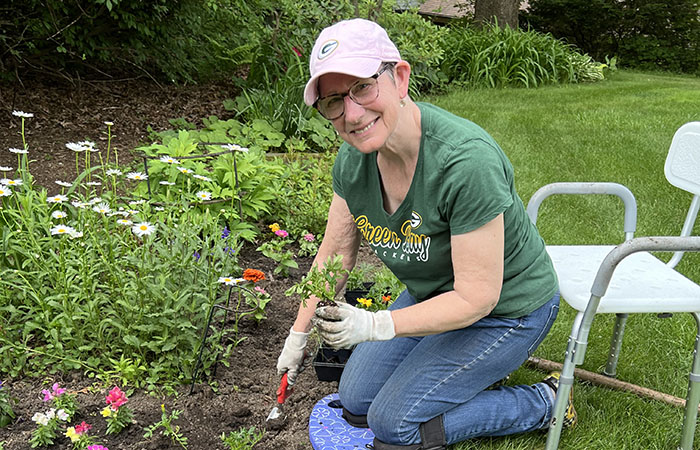Nancy’s story
A vacation to Kohler to celebrate their 40th wedding anniversary was cut short for Nancy and her husband, John, of Davenport, IA. Shortly after arriving at their cottage, Nancy suddenly felt dizzy and had a buzzing sensation in her left arm. When she smiled to reassure her husband, he saw the left side of her mouth was drooping.
“John said, ‘I think you may be having a stroke,’” Nancy recalled. “He didn’t hesitate and called 9-1-1.”
Nancy was rushed by ambulance to HSHS St. Nicholas Hospital’s emergency department in Sheboygan, where the team quickly determined she needed specialized stroke care as soon as possible. They immediately transferred Nancy to St. Nicholas’ sister hospital, HSHS St. Vincent Hospital in Green Bay.
“When I arrived, the stroke care team led by Dr. Alison Meyer was waiting and ready for me,” said Nancy. “I began to realize how serious my situation was by how fast everything was moving.”
In a thrombectomy, a surgeon removes the blood clot(s) in a patient’s vein or artery that is blocking oxygen and blood flow to the brain – the primary cause of thrombotic stroke. The procedure is a proven method to reduce risk of death and permanent disability in stroke patients – and it was exactly what Nancy needed for the type of stroke she was experiencing.
After emergency stroke care treatment, Nancy spent two and a half weeks at HSHS St. Vincent Hospital recovering and going through rehabilitation with specialists from Prevea’s neurological therapy program. Thanks to her team of care givers, she gained more mobility, strength, and balance, and during rehab, she learned to walk without a walker or a cane.
“I felt so lucky to be at a hospital where I received the best care imaginable,” said Nancy. “Every member of my team, from the stroke specialists, housekeepers, food service personnel, to occupational and physical therapists, treated me with respect, care and competence while exhibiting an attitude of joy. The care each of them provided says a lot about the culture of the staff at St. Vincent.”
“Dr. Alison Meyer was my savior. The good Lord was looking out for me,” said Nancy. “I owe so much to her and her team and am so thankful the neural intervention procedure was available to me. I am forever indebted to St. Vincent and Green Bay because of Dr. Meyer!”
Four months following her stroke, Nancy regained the strength and balance needed to once again enjoy a springtime activity she has embraced for decades – planting her beloved garden. It’s an achievement she credits to the expert treatment she received at HSHS St. Vincent Hospital, led by Prevea’s Dr. Meyer.
“I’ve planted those flowers year in and year out over the course of my life,” said Nancy. “The spring following my stroke, my therapeutic goal was to plant my garden again. I succeeded, thanks to the care at St. Vincent. It was this team that replanted a magical garden of joy, in my heart. Thank you!”

During a stroke, approximately 1.9 million brain cells die per minute. If you or someone you know is experiencing signs of symptoms of a stroke, call 911 and get to the nearest emergency room as soon as possible.
“John said, ‘I think you may be having a stroke,’” Nancy recalled. “He didn’t hesitate and called 9-1-1.”
Nancy was rushed by ambulance to HSHS St. Nicholas Hospital’s emergency department in Sheboygan, where the team quickly determined she needed specialized stroke care as soon as possible. They immediately transferred Nancy to St. Nicholas’ sister hospital, HSHS St. Vincent Hospital in Green Bay.
Expert stroke care with HSHS St. Vincent Hospital and Prevea Health
HSHS St. Vincent Hospital’s Comprehensive Stroke Center is the region’s trusted leader in stroke care. It is staffed 24/7 by Prevea Health neurointerventional surgeons who specialize in thrombectomy – a procedure that stops stroke in its tracks. HSHS St. Vincent Hospital ranks third in the state of Wisconsin for number of thrombectomies performed each year.“When I arrived, the stroke care team led by Dr. Alison Meyer was waiting and ready for me,” said Nancy. “I began to realize how serious my situation was by how fast everything was moving.”
In a thrombectomy, a surgeon removes the blood clot(s) in a patient’s vein or artery that is blocking oxygen and blood flow to the brain – the primary cause of thrombotic stroke. The procedure is a proven method to reduce risk of death and permanent disability in stroke patients – and it was exactly what Nancy needed for the type of stroke she was experiencing.
‘I have neurons to save.’
“While I don’t recall much about going into surgery, I will never forget Dr. Meyer saying, ‘Let’s go! I have neurons to save.’,” said Nancy. “Dr. Meyer went on to break up the blood clot right away and for that, I credit her for saving my life and for providing me the quality of the life I have today.”After emergency stroke care treatment, Nancy spent two and a half weeks at HSHS St. Vincent Hospital recovering and going through rehabilitation with specialists from Prevea’s neurological therapy program. Thanks to her team of care givers, she gained more mobility, strength, and balance, and during rehab, she learned to walk without a walker or a cane.
“I felt so lucky to be at a hospital where I received the best care imaginable,” said Nancy. “Every member of my team, from the stroke specialists, housekeepers, food service personnel, to occupational and physical therapists, treated me with respect, care and competence while exhibiting an attitude of joy. The care each of them provided says a lot about the culture of the staff at St. Vincent.”
Thankful, and back to gardening
After Nancy left the hospital, she continued to make progress with her therapists back home in Iowa. She has noticed continued improvements to her health, thanks in great part to the immediate care provided by Dr. Meyer and her team.“Dr. Alison Meyer was my savior. The good Lord was looking out for me,” said Nancy. “I owe so much to her and her team and am so thankful the neural intervention procedure was available to me. I am forever indebted to St. Vincent and Green Bay because of Dr. Meyer!”
Four months following her stroke, Nancy regained the strength and balance needed to once again enjoy a springtime activity she has embraced for decades – planting her beloved garden. It’s an achievement she credits to the expert treatment she received at HSHS St. Vincent Hospital, led by Prevea’s Dr. Meyer.
“I’ve planted those flowers year in and year out over the course of my life,” said Nancy. “The spring following my stroke, my therapeutic goal was to plant my garden again. I succeeded, thanks to the care at St. Vincent. It was this team that replanted a magical garden of joy, in my heart. Thank you!”

During a stroke, approximately 1.9 million brain cells die per minute. If you or someone you know is experiencing signs of symptoms of a stroke, call 911 and get to the nearest emergency room as soon as possible.
